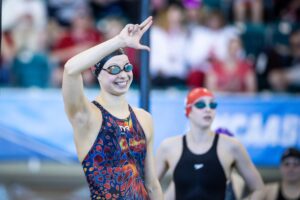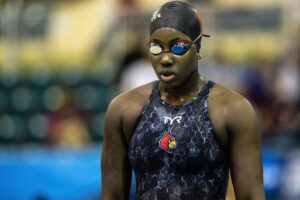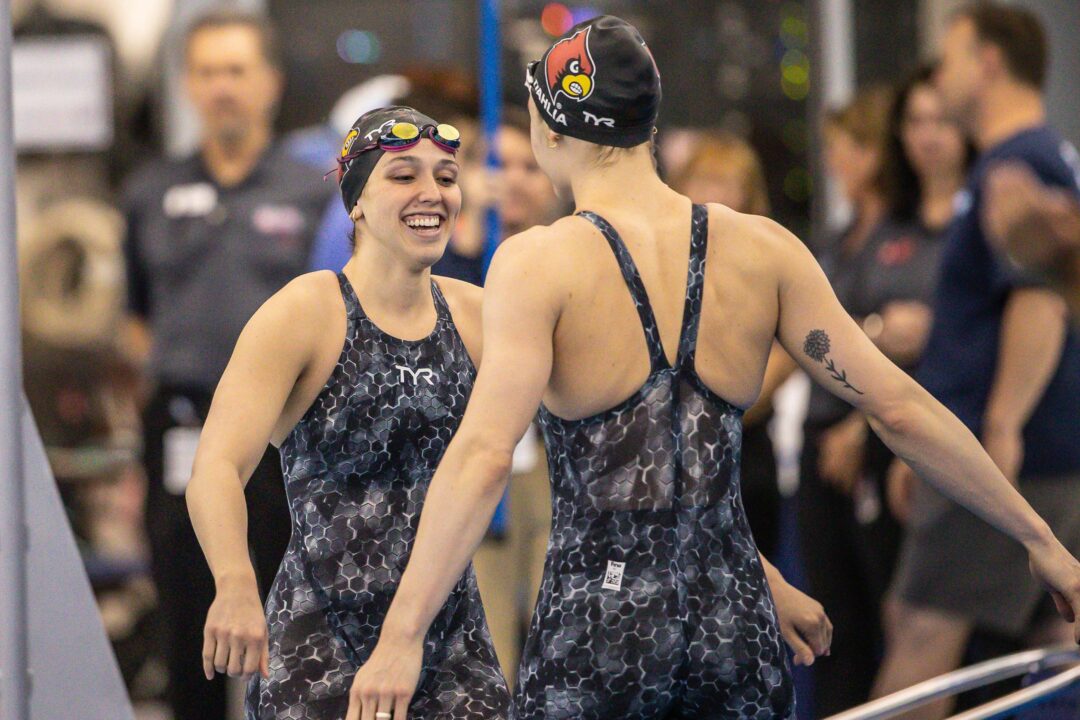It’s that time of the year again. SwimSwam will be previewing the top 12 men’s and women’s teams (and then some) from the 2022 NCAA Championships. Follow along with the College Swimming Preview Channel. Want to read even more? Check out the latest edition of the SwimSwam magazine.
#6 Louisville Cardinals
Key Losses: Mariia Astashkina (NCAA qualifier), Morgan Friesen (NCAA qualifier), Arina Openysheva (4 NCAA relays), Duda Sumida (NCAA qualifier), Kaylee Wheeler (2 NCAA relays), Polina Nevmovenko (1 NCAA relay), Tatiana Salcutan (NCAA qualifier)
Key Additions: #16 Ella Welch (KY – free/breast), BOTR Paige Kuwata (NV – distance free, fly, IM), Jordan Durocher (VA – IM), Karoline Barrett (Denmark – fly/free), Cecilia Viberg (Sweden – breast)
Fifth years: Alena Kraus (2 NCAA points)
GRADING CRITERIA
Three years ago, we unveiled a new, more data-based grading criteria based on ‘projected returning points’, a stat of our own making that involved a lot of manual calculations involving departing seniors, redshirts, freshmen, etc. We liked the objectiveness of that stat, but given that there’s still a lot of uncertainty for this year, we’re adopting a hybrid approach this year. The “stars” will rely heavily on what swimmers actually did last year, but we’ll also give credit to returning swimmers or freshmen who have times that would have scored last year.
Since we only profile the top 12 teams in this format, our grades are designed with that range in mind. In the grand scheme of college swimming and compared to all other college programs, top 12 NCAA programs would pretty much all grade well across the board. But in the interest of making these previews informative, our grading scale is tough – designed to show the tiers between the good stroke groups, the great ones, and the 2015 Texas fly group types.
- 5 star (★★★★★) – a rare, elite NCAA group projected to score 25+ points per event
- 4 star (★★★★) – a very, very good NCAA group projected to score 15-24 points per event
- 3 star (★★★) – a good NCAA group projected to score 5-14 points per event
- 2 star (★★) – a solid NCAA group projected to score 1-4 points per event
- 1 star (★) – an NCAA group that is projected to score no points per event, though that doesn’t mean it’s without potential scorers – they’ll just need to leapfrog some swimmers ahead of them to do it
We’ll grade each event discipline: sprint free (which we define to include all the relay-distance freestyle events, so 50, 100 and 200), distance free, IM, breaststroke, backstroke, butterfly and diving. Use these grades as a jumping-off point for discussion, rather than a reason to be angry.
2021-2022 Lookback
Louisville’s season began fairly quietly, as the Cardinals didn’t really show their hand during the fall. But they started popping off in January, with fast times and school records going down in January dual meets.
Rye Ulett, a top-ten recruit in the high school girls class of 2022, graduated high school early and arrived at Louisville for the spring semester, and she quickly took down the school record in the 200 back. Liberty Williams broke the school record in the 1650 at the same meet.
Fast forward a month, and Williams was part of a Louisville sophomore class that scored 393 points at the ACC Championships, the most by any class from any school at the meet. That group, which also contained NCAA qualifiers Gabi Albiero, Paige Hetrick, Triten Ulett, and diver Else Prastterink, spurred the Cardinal women to a 3rd-place finish behind juggernauts UVA and NC State.
Albiero, Hetrick, and Ulett were all among the top-ranked recruits in the nation in the high school class of 2020, and they show that the Louisville women, at least, seem to finally be turning a corner in consistently attracting some of the top talent in the nation.
The momentum continued into NCAAs, where Louisville bounced back from a 13th place finish in 2021 to 6th place in 2022, hurtling over the likes of Cal and Michigan in the process.
Individually the big star was Gabi Albiero, who came within a whisker of making the A-final in three events. She won the 50 free B-final, finished 6th in the 100 fly and 5th in the 100 free, and was a lynchpin of the Louisville relays.
Outside of Albiero, there wasn’t anything too flashy about the Cardinals’ performances, but they hauled in the NCAA points using the standard Louisville modus operandi — five scoring relays coupled with just enough individual scoring to get the job done.
The relays ranged from 5th in the 200 free relay to 11th in the 400 medley relay, and four of the five finished in the top 8.
Another seven women earned individual points, including double-digit points from Abby Hay and Tristen Ulett. And, it bodes well for the future that they bring back all eight individual scorers, although they’ll need to replace four relays legs filled by Arina Openysheva, and two from Kaylee Wheeler.
Sprint Free: ★★★
Louisville excelled in the sprint free relays despite only having one individual freestyle scorer. That’s something we’ve seen for the Louisville men as well, which is a good indicator of both depth and the kind of culture head coach Arthur Albiero has created.
That one individual scorer was, of course, Gabi Albiero, who missed making the 50 free A-final by less than a tenth of a second, then won the B-final that evening. She also tied for 5th in the 100 free, racking up 22.5 free points for the Cardinals. While there’s
Paige Hetrick came the closest of the rest of the Cardinals to scoring, finishing 18th in the 200 free. Her seed time of 1:44.80 would’ve put her into the B-final had she swum that time in prelims, so she stands a decent chance of scoring this season.
Sprint stalwart Christiana Regenauer provided solid 21.4/47.5 relay splits, and she qualified individually, finishing 27th in the 50 free and 28th in the 100 free, just shy off of her lifetime bests of 22.10/48.44 with both swims.
Although she focuses on the butterfly event individually, Tristen Ulett has free speed, splitting 21.7/48.0/1:44.4 on the free relays.
Local star Ella Welch could make a quick impact as a freshman; she’s already been 22.35/48.81/1:46.04 across the sprint free distances. Those times are all within striking distance of NCAA qualification, and she could be a plug and play option to replace outgoing senior Arina Openysheva on relays, especially the shorter two freestyle ones.
Freshman Karoline Barrett of Denmark could make an immediate impact as well – her best SCM times convert to roughly 22.33/49.40 in yards.
Distance Free: ★★★

Liberty Williams (photo: Jack Spitser)
Liberty Williams headlines the distance group after a sophomore year that saw her break the school record in the 1650 twice. She first broke it seemingly randomly at a dual meet in January, where she improved her lifetime best from 16:06.56 (from 2021 ACCs) down to 15:53.60.
She then demolished that time with an ACC title time of 15:43.21, winning that event by 17 seconds. Unfortunately, she couldn’t match her time at NCAAs, but even her 16:04 there was enough to finish 13th. That 15:43 from ACCs would’ve earned her 2nd place at NCAAs, and was less than 3 seconds shy of Paige McKenna’s winning time, so she could be in the mix for a NCAA title if she can peak in March this season.
Williams also went 4:38.79 in the 500 that January dual meet — that would’ve put her in the B-final at NCAAs.
Williams should get a great training partner in the form of freshman Paige Kuwata. She’s been part of the Sandpipers club that’s been churning out great distance swimmers, and she’ll arrive at Louisville having already gone 16:11.10 in the 1650, under what it took to qualify for the meet lat year. She’ also been 4:43.86 in the 500. Both of those aren’t far off what it took to score last year either, so she could score sooner rather than later.
While the team loses Polina Nevmovenko, who has transferred to Auburn, Louisville has some ACC depth with Paige McCormick (4:47.59/16:32.41) and Maddie Luther (4:48.49/16:24.26).
Backstroke: ★★
Louisville’s fastest relay-distance backstroker didn’t even swim in a backstroke event at NCAAs. We’re talking bout Abby Hay, who led off Louisville’s medley relays in 23.86/51.48, but swam the 400 IM and 200 fly instead of the backstrokes. Both of the times were the fastest on the team during the season, and that 100 time would’ve made the B-final of that event at NCAAs.
The Cardinals didn’t have anyone score in the 100 back, but Paige Hetrick and Rye Ulett both scored in the 200, finishing 12th and 16th. Hetrick hit lifetime bests of 52.22/1:52.05 last year, while Ulett has been 52.26/1:51.84, with that 200 time coming back in high school.
She wasn’t to far off that time last year (1:52.58) shortly after joining the Cardinals, and watch out for her this season as she has a super-high ceiling with another year of more stable training. The “two star” grade above is based on last year’s performances and best times, but this group has the potential to bring in far more points this year.
Breaststroke: ★
The Cardinals lose five NCAA qualifiers; three of them were breaststrokers, and, in fact, they don’t return a single NCAA breaststroke swim. To make matters worse, Adeline Farrington, who didn’t qualify for NCAAs, but did make the 100 breast A-final at ACCs, doesn’t appear on the roster for what should be her junior season.
Into that gap will dive freshman Ella Welch. We already highlighted her as a sprint freestyler, but she’s also an excellent breaststroker, having been 1:00.79/2:15.81. It’ll be interesting to see which way she develops more during her time in Louisville, but right now there stands a strong chance she could be the Cardinals’ short-term solution on the breaststroke leg of the medley relays, and swim all three free relays as well.
However, the Cardinals aren’t completely bereft of additional options. German national Kim Herkle hit bests of 1:01.70/2:11.21 last year as a freshman, and that 200 time is roughly two seconds shy of what it took to qualify for NCAAs last year.
The Cards also add Swedish breaststroker Cecilia Viberg to the mix, who established long course bests of 31.6/1:09.4/2:39.3 this past April. That 50-meter time should make her a future asset on the 200 medley relay (27-mid conversion) and she could be a future player in the 100 breast (1:00.7 conversion).
Butterfly: ★★★★
This may be the Cardinals strongest group, as four women scored at NCAAs last year. Gabi Albiero took a huge leap forward as a sophomore, improving from a 51.59 best time in 2021 and a 27th placing showing in prelims to a 6th-place finish this year.

Tristen Ulett (photo: Jack Spitser)
Tristen Ulett was the only Cardinal to score in both the 100 and the 200 fly last year, finishing 12th in both. She hit lifetime bests in both final swims, recording times of 51.02 and 1:53.63.
Another two women scored in the 200 fly. Abby Hay added points with a 14th place performance; she went 1:54.44, just 0.01s slower than her personal best from ACCs. She also clocked a best time in the 100 fly last year with a 52.38 at the Purdue Invite. Alena Kraus was a bit off of her best times of 52.52 and 1:54.14 last year, but she earned a second swim at NCAAs and finished 15th at 1:54.81.
Freshman Karoline Barrett could provide some depth down the road, her 100 fly best time converts to 53.22.
IM: ★★★
This is another strong discipline for the Cardinals, and once again, Abby Hay figures prominently. She scored in both distances last year, finishing 7th in the 200 IM and 12th in the 400 IM. She clocked lifetime bests in both races at NCAAs, going 1:54.33 in prelims of the 200 and 4:06.35 in finals of the 400.
The Ulett sisters both swam the 200, with Rye tying for 28th in prelims and Tristen finishing 39th. Rye hit a lifetime best of 1:56.88 with that swim, while Tristen went 1:56.36 at ACCs. It took a 1:55.90 to score last year, so either could score with a strong swim.
Paige Kuwata had an Olympic Trials cut in the 400 IM (LCM) and she’s been 4:16.82 in yards, so this may be the event she pairs with the 500 and 1650 in her championship lineup.
Kuwait’s fellow freshman Jordan Durocher already nearly has a NCAA cut in the 400 — she’s been 4:11.88, and it took a 4:11.60 to earn an invite last season. She’s also been 2:02.38 in the 200.
Diving: ★★
Else Praasterink returns after picking up 7 points with a 10th place finish in the platform event at NCAAs. It’s a thin group behind her, as she was the only Cardinal diver to score at ACCs, much less NCAAs. Freshman Jiselle Miller arrives after finishing as the 1m runner-up at the 2022 IHSAA State Championships.
Relays: ★★★★
There are some crucial gaps here left by the departure of two swimmers, but Ella Welch alone should be able to fill in most of the holes.
Their best relay, the 200 free, could actually improve by adding either Welch or Barrett to replace Openshyeva. The 400 free relay could be a bit trickier, as no returns who weren’t already on the relay have been under 49.1, which is a ways off of Openshyeva’s 47.5 anchor. Openshyeva’s absence may be felt even more acutely in the 800 free relay, as her 1:43.59 leadoff was the Cardinals’ fastest 200 free time of the year. However, Paige Hetrick split 1:43.44 at ACCs, so look for her to take Openysheva’s leg at NCAAs.
The Cards bring back 3/4 of the 8th-place 200 medley relay, and they’ll be looking to someone, presumably Welch again, to replace Kaylee Wheeler’s 26.68 breaststroke leg. Regenauer vs Albiero on fly. Both Wheeler and Openysheva swam on the 11th-place 400 medley relay. Welch only needs to drop about a second to replace Wheeler’s 59.35 breaststroke split.
Total Stars: 22/40
2022-2023 Outlook
The Cardinals don’t lose a single individual scorer — and that’s a great start. They’ve been recruiting well the last few years, and that was evident in the fact that they had six underclassmen score last year, all of which return.
Albiero should continue to develop as one of the all-around sprint stars of the NCAA this season. The IM and fly groups should pull in plenty of points too, while Liberty Williams could score big if she can match her best times at NCAAs.
The relay losses are tough, but should not be insurmountable, and even if the relays take a small step back, the Cardinals stand a good chance of increasing their individual scoring. It’s tough to see them breaking into the top five without a couple more swimmers capable of making multiple A-finals, but it feels like we can comfortably pencil them into that 6th-8th place tier that they’ve occupied for much of the last eight years or so.
WOMEN’S PREVIEW INDEX
| Team | Sprint Free | Distance Free | Backstroke | Breaststroke | Butterfly | IM | Diving | Relays | Total Stars |
| 1 | |||||||||
| 2 | |||||||||
| 3 | |||||||||
| 4 | |||||||||
| 5 | |||||||||
| #6 Louisville Cardinals | ★★★ | ★★★ | ★★ | ★ | ★★★★ | ★★★ | ★★ | ★★★★ | 22/40 |
| #7 Michigan Wolverines | ★★★ | ★★ | ★ | ★★ | ★ | ★★ | ★ | ★★★ | 15/40 |
| #8 California Golden Bears | ★ | ★ | ★★★ | ★ | ★★★ | ★★★ | ★ | ★★★ | 16/40 |
| #9 Ohio State Buckeyes | ★★★ | ★★★ | ★★ | ★★★ | ★★ | ★★ | ★★★ | ★★★★ | 22/40 |
| #10 Tennessee Volunteers | ★★★ | ★★★★ | ★★★ | ★★★ | ★★★ | ★★★★ | ★ | ★★★ | 24/40 |
| #11 Indiana Hoosiers | ★★ | ★★ | ★ | ★★★ | ★ | ★★ | ★★★★ | ★ | 16/40 |
| #12 Kentucky Wildcats | ★ | ★ | ★★ | ★★★ | ★★ | ★★★ | ★★ | ★★ | 16/40 |

I believe Farrington did make the meet but then scratched: https://staging2.swimswam.com/2022-womens-di-ncaas-louisvilles-farrington-scratches-tennessees-harper-in/
Jiselle is a BEAST- great addition to the team!
Does anyone know when the SwimSwam magazine will be sent out?
Lets go T!!!!!!!!
I love this series by the way…
christiana regenauer GOAT
Cecilia Wiberg should add strength on breast
Go Jordan!!!